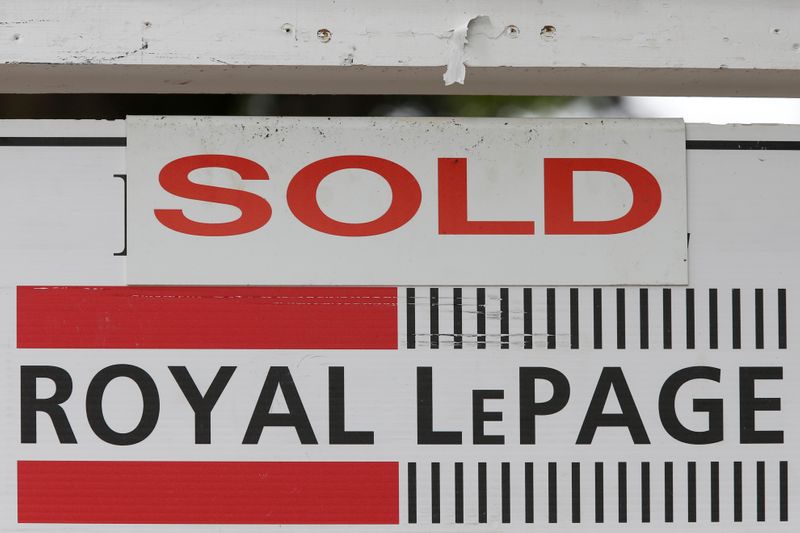By Julie Gordon and Nichola Saminather
OTTAWA (Reuters) - Canada's red-hot housing market has become a bonfire, spurring comparisons to earlier bubbles and prompting calls for cooling measures. But policymakers are standing back, unwilling to intervene for fear of undermining Canada's still-fragile economic recovery from the COVID-19 pandemic.
Real estate agents say after months of end users driving sales, investors are again a factor in the market and flipping activity is picking up. In response, desperate buyers are over-extending themselves, paying tens of thousands more than originally budgeted just to get in.
While Bank of Canada Governor Tiff Macklem in February acknowledged "some signs of excess exuberance" in the housing market, he downplayed the need for action.
"Right now the economy is weak, we're just coming out of the second wave. I think we need the support, we need the growth we can get," Macklem said.
The pandemic shift to working from home coupled with rock-bottom mortgage rates and government aid is driving up housing prices around the world - with suburban homes and vacation towns outperforming big cities from Australia to Europe and North America.
In Canada, the average home price jumped 22.8% in January to a record C$621,525 ($490,820). A sharp escalation since November is fueling fears that speculation and so-called FOMO, the fear of missing out, have again taken root.
Graphic: Home price escalation in Canada https://graphics.reuters.com/CANADA-ECONOMY/HOUSING/nmovazeolpa/chart.png
Toronto and Vancouver area brokers say it is starting to feel like the height of the last bubble, when regional prices were rising by as much as 6% each month.
"It's on steroids. It really reminds me of 2017," said Nasma Ali, a Toronto agent who sold a home last month for C$1.59 million, C$340,000 over the asking price.
In other markets, like Ottawa and the cottage towns that have boomed as white-collar workers gamble they will not be called back to the office, the frenzy is like nothing agents have ever seen before.
"If you got in four months ago, you just made C$100,000," said Ottawa agent Judy Corriveau of entry-level homes popular with investors.
"As far as investments go, it's a lot better than the stock market ... Unless you got in on GameStop (NYSE:GME)," she said, referring to a Reddit-darling stock that skyrocketed earlier this year.
Mortgage lending has hit record levels and riskier higher-ratio borrowers now make up 23% of new uninsured loans, more than in the 2017 bubble, according to National Bank of Canada (OTC:NTIOF). If the flight to smaller cities reverses, a surge of homes could flood the market.
"It seems like policymakers are blowing a pretty big bubble here," said Steve Saretsky, a Vancouver agent and analyst. "You have house prices up 20% in the midst of really high unemployment. It's certainly not a healthy market."
'HEARTBREAKING'
While the Bank of Canada, like other central banks, is unlikely to raise interest rates just to cool housing, experts say policymakers could look at tax measures and tougher lending rules for investors, similar to those imposed by New Zealand's central bank.
"A 40% equity downpayment for a rental purchase is a whole lot more of a stringent requirement than we have here. Those types of things are smart for our domestic regulators to be considering," said Paul Taylor, chief executive of Mortgage Professionals Canada.
Taylor, who represents mortgage brokers and insurers, added that any policy should discourage investors while encouraging owner-occupants, particularly in lower-priced segments popular with first-time buyers.
Housing affordability advocates, meanwhile, are calling for tax changes to target investors and a rethink of an exemption that allows homeowners to pocket all profits from the sale of a primary residence.
But a senior government source said "now is not really the time to be ratcheting anything down," pointing to the ongoing economic pressures.
Canada's residential real estate sector accounted for around 17% of GDP growth in the fourth quarter of 2020 and employment in the sector that includes real estate activity was 5.4% above pre-pandemic levels, with construction jobs up 3.4%.
Broker Corriveau in Ottawa said it is "heartbreaking" to see first-time buyers struggle.
"You don't know if there is going to be that one person who has lost 10 bidding wars and now is going to bid C$50,000 more than necessary just because they want to be done with it."

($1 = 1.2663 Canadian dollars)
